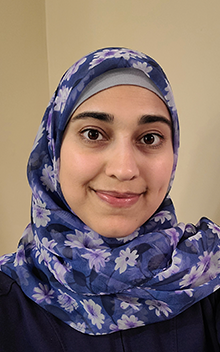Multicultural Social Work
2022 MSW@Denver grad Shaema Imam plans to work as a therapist with older immigrants
Shaema Imam has held many roles in her lifetime, but identity and a belief in the value of community have been consistent guideposts. Initially, Imam earned a bachelor’s degree in microbiology and immunology and planned to be a medical researcher. Her younger sister died of leukemia at age 15, and Imam wanted to find a cure. “Why do people get sick in the first place, and what can help them heal when they do?” she wondered.
The experience with her sister’s illness eventually led Imam to social work.
“Our family could have benefitted from more opportunities to talk about my sister’s illness and process our feelings, and by so doing I think we could have been a better support to her,” says Imam, a Muslim whose parents immigrated from Pakistan to Canada in the late 1960s. “Illness is about so much more than the medical aspect. Our culture — likely like many others — avoids talking openly about possible negative outcomes, and not considering the possibility of a terminal illness I think made it harder for my sister to talk about it, too. Many things were likely left unsaid, and the opportunities died with her, sadly.”
Following a brief detour in a nursing program that “wasn’t the best fit,” Imam earned a BSW. She is a wife and mother to three teenage sons, who she homeschooled for several years when they lived overseas and again while living in Atlanta, Georgia, at the start of the pandemic. Imam did community development work in Bahrain and Dubai, is fluent in English, French and Urdu/Hindi and is learning Arabic as well.
And now, having graduated this spring from the University of Denver Graduate School of Social Work MSW@Denver online MSW program, she is a master’s level social worker pursuing licensure. Ultimately, Imam hopes to bridge her interests in community development, community-based housing and mutual aid with practice as a therapist focused on posttraumatic growth and utilizing solution-focused brief therapy (she’s a member of the Solution-Focused Brief Therapy Association Equity, Diversity, and Inclusion Committee).
There are too few therapists of color in the United States and Canada — particularly therapists of Asian or Muslim background — Imam notes. She would like to address the needs of the older adult immigrant population in North America, possibly in the context of intergenerational communication. “Is there a way that brings together the best of the elder’s own culture and identity with what is available and possible in the U.S., often far from these elders’ countries of origin?” Imam wonders. “Since many elders have health challenges at this stage of life, working in a health care setting may help me to reach more people in this population.”
Her MSW@Denver degree and concentration in Mental Health and Trauma prepared her well for this new direction, she says. “The MSW@Denver has a nice mix — covering micro to macro, policy analysis, studying different types of discrimination,” Imam says, noting that the program offers “so many opportunities to explore.”
“Within social work, there are many ways to help people,” Imam adds, “there’s a place for every practitioner to contribute and every client to get what they need.”





